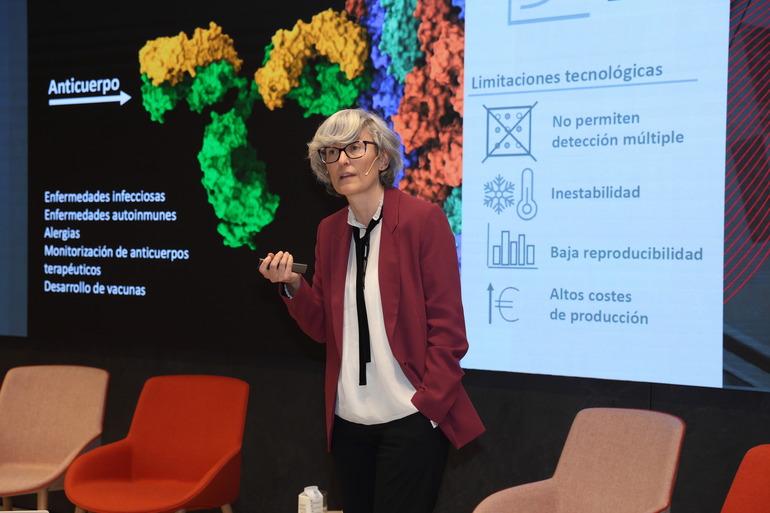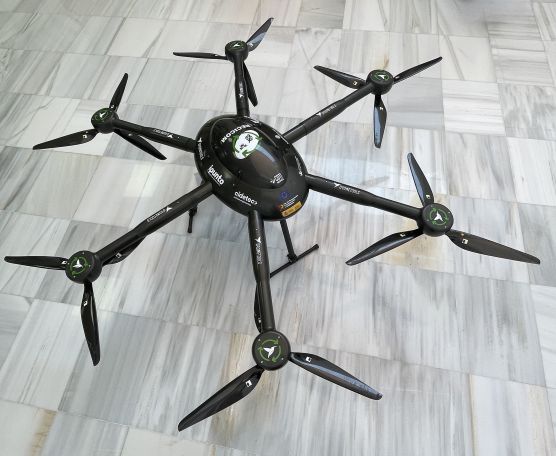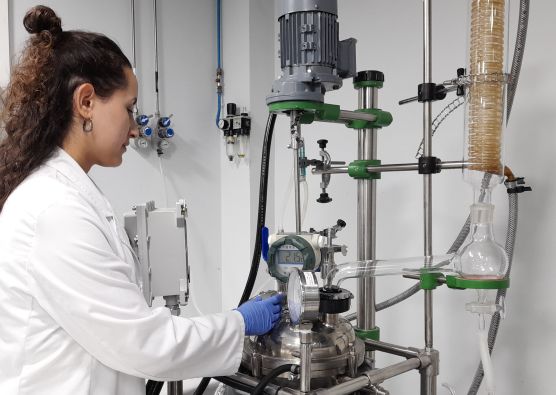Nanosensors for rapid antibody detection based on technology patented by CIC biomaGUNE

CIC biomaGUNE matures an entrepreneurial project to commercialise innovative devices for the detection of respiratory diseases in self-testing format.
The project, backed by Basque Tek Ventures, presents an in vitrodiagnostic solution with lower cost reagents that do not require the use of animals.
Self-testing devices to detect and quantify antibodies have become particularly relevant in recent years due to the implementation of personalised medicine, immune-related diseases or the threat of epidemics and pandemics. During the COVID-19 pandemic, the potential of such medical tools was more than demonstrated.
However, current in vitro diagnostic platforms show some drawbacks, such as high costs and reliance on animals for reagent production, lack of information beyond positive or negative results, and low versatility and adaptability for new diseases, as long and costly protocols have to be run , application-specific reagents have to be developed, etc.
In order to respond to the need for easy-to-use diagnostic platforms for infectious diseases with the capacity to test for multiple diseases simultaneously, and to preserve the ethical commitment to the use of animals, CIC biomaGUNE is developing a business project backed by more than 10 years of scientific research, which has patented technology and is led by Ikerbasque professor Aitziber López Cortajarena (scientific director of CIC biomaGUNE). The project has recently been promoted by the new Basque Tek Ventures initiative, aimed at supporting and accompanying the creation of new technology-based companies, which identifies and prioritises the technological assets with the greatest potential, supports the creation of high-performance teams and accompanies the start-up of the company and its access to the market.
The technology developed and patented by CIC biomaGUNE is based on the detection of antibodies using nanosensors developed by the Biomolecular Nanotechnology group, under the direction of Professor Cortajarena. These are designer proteins capable of stabilising nanomaterials with catalytic or luminescent properties. “The biosensors used in diagnostics consist of a biorecognition element and a transducer element, which provides the signal in the presence of the molecule to be detected. We have managed to develop nanosensors that integrate the two elements in a single molecule: a specific biorecognition site is incorporated into the design protein with the nanomaterial,’ explains Professor Cortajarena.
Numerous advantages
There are many advantages to this new technology, as “itovercomes many of the limitations of the technologies currently used, such as reproducibility between different batches, production costs, the time needed to generate new reagents, etc.,” says Cortajarena. They also highlight the design flexibility, detection sensitivity and reagent stability of the technology developed by CIC biomaGUNE.
“By simply changing the biorecognition element, the nanosensors can be adapted to detect any type of antibody. So new nanosensors can be developed for new needs very quickly,’ he says. Moreover, thanks to the possibility of integrating nanosensors for different antibodies of interest in the same device, “it would be possible to simultaneously analyse the presence of different antibodies, i.e. a multiple detection system could be integrated in the same device,” he adds. This “robust, low-cost and easily adaptable system design for the detection of different antibodies” also has the advantage that “the reagents are not based on animal-generated antibodies or expensive systems. It is a more ethical and sustainable technology.
In a first step, proof of concept tests have been carried out on respiratory diseases, “because the project is based on work that was developed just when the pandemic began, and because we needed to quickly diagnose infections that are not known to be viral or bacterial in order to determine how to treat them,” says the professor. Thus, as a first point of entry into the market, the detection of human respiratory infectious diseases (caused by different respiratory viruses, influenza, COVID, etc.) is being considered. But the versatility of this technology goes beyond that, as it “can be used to determine antibodies to any infectious disease, such as sexually transmitted diseases, autoimmune diseases or allergies, among others. The indications can be very broad,” says Cortajarena.
The antibody detection technology based on these nanosensors developed at CIC biomaGUNE “has been validated at laboratory level. Now we have to enter the prototyping phase. A pilot study is needed to validate it in a clinical setting. But in view of the advantages of this technology, “we are confident that the industry producing rapid test devices will be interested in it,” says Cortajarena.
About Aitziber López Cortajarena
Professor Ikerbasque Cortajarena holds a PhD in Biochemistry from the University of the Basque Country (2002), and worked as an associate scientist in protein design at Yale University until 2009. In 2010 she started her independent research in nanobiotechnology at Institute IMDEA Nanoscience until 2016, when she joined CIC biomaGUNE. She is the author of more than 100 scientific articles that have been cited more than 2,900 times, 2 edited books and 5 patents.
Her work has been recognised with the Horizon Award of the Royal Society of Chemistry, the Award for Research Excellence of the Spanish Royal Society of Chemistry and the Ikerbasque Award for Women in Science. She has been distinguished in the Platform for Women Scientists and Innovators of the Spanish Ministry of Science and Innovation. She is Associate Editor of ACS Applied Biomaterials, ACS Publications, and Senior Editor of Protein Science, Wiley. She is Vice-President of the Spanish Society of Biophysics, member of the Council of the European Association of Biophysical Societies and member of the Council of the International Protein Society. In 2023 she was appointed corresponding academician of the physics and chemistry section of the Royal Academy of Sciences.
She has been awarded numerous European projects, including an ERC Consolidator Grant (ProNANO), two ERC-Proof of Concept (NIMM; NanoImaging), an ERA-CoBioTech, four FET-Open projects (e-Prot, ARTIBLED, FairyLights, DeDNAed), and an EIC Pathfinder project (iSenseDNA), among others. Cortajarena enjoys a solid reputation in the field of protein engineering and the group is achieving worldwide recognition due to its key contributions to the design and development of protein-based hybrids with defined architectures and functionalities.




